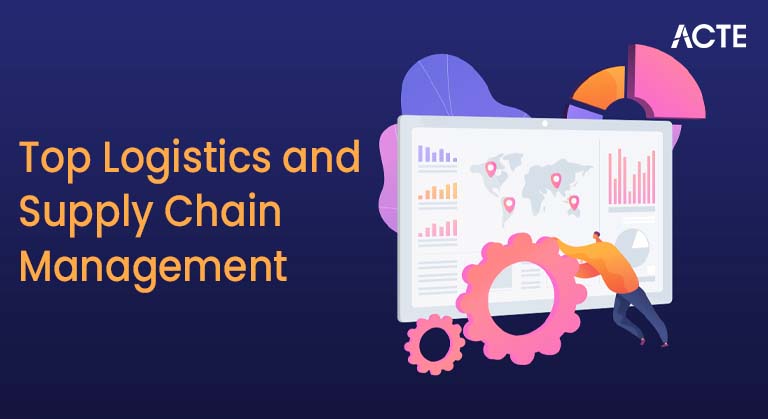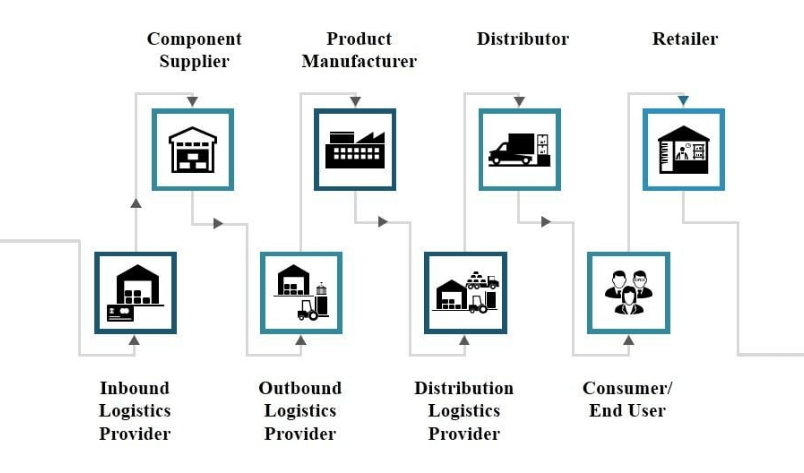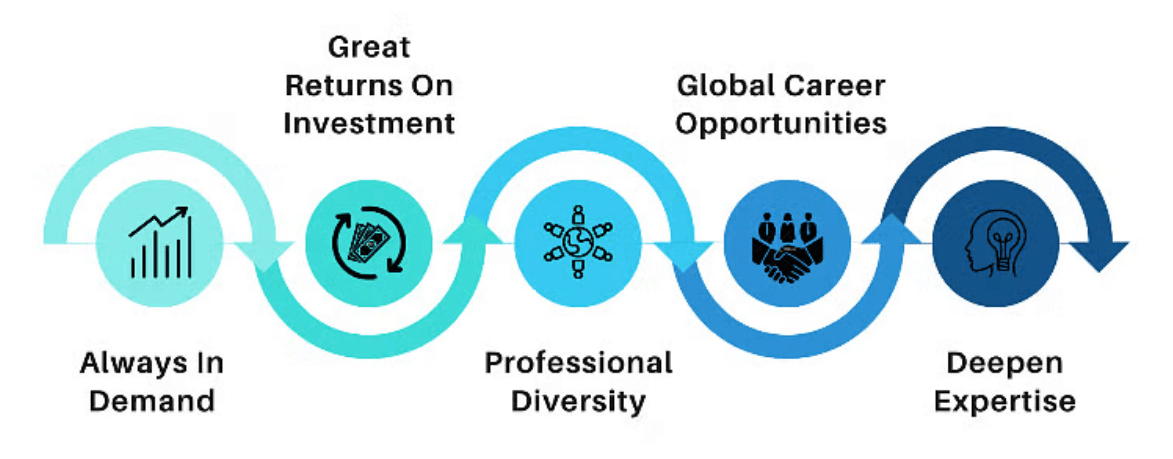
- Introduction
- Importance of Logistics and Supply Chain Management
- Overview of Logistics and Supply Chain Management Courses
- Types of Courses Available
- Key Skills Developed Through These Courses
- Top Institutions Offering Supply Chain and Logistics Programs
- Online vs. Traditional Learning: Which is Better?
- Conclusion
Introduction
In today’s fast-paced and interconnected global economy, logistics and supply chain management (SCM) has become a vital discipline for organizations striving to stay competitive. It acts as the backbone of modern business, linking manufacturers, suppliers, distributors, retailers, and customers in a seamless flow of goods, information, and services. An efficient supply chain not only reduces operational costs but also enhances customer satisfaction, improves delivery performance, and helps companies respond swiftly to changing market demands. With globalization, e-commerce growth, and technological advancements, the complexity of supply chains has increased dramatically. As a result, the need for skilled logistics and SCM professionals is on the rise across industries from retail and manufacturing to healthcare and technology. These professionals, equipped with PMP Training, play a critical role in inventory control, procurement, transportation, warehousing, and demand forecasting. To meet this growing demand, a wide range of educational institutions, including universities, business schools, and online learning platforms, now offer specialized courses in logistics and supply chain management. These programs are designed to equip learners with both theoretical foundations and practical tools for navigating and optimizing complex supply networks. Courses often cover topics such as supply chain strategy, logistics operations, inventory management, global sourcing, and the integration of emerging technologies like AI and blockchain. Whether you’re a recent graduate looking to enter the field, a working professional aiming to upskill, or a business leader seeking to enhance supply chain performance, these courses offer valuable insights and career pathways. This blog explores everything you need to know about logistics and supply chain management courses from what they cover, the skills they teach, to the career opportunities they can unlock in today’s dynamic business environment.
Are You Interested in Learning More About PMP? Sign Up For Our PMP Certification Training Today!
Importance of Logistics and Supply Chain Management
Logistics and supply chain management (SCM) involves the strategic coordination of the flow of goods, information, and resources from the point of origin to the point of consumption. It plays a critical role in ensuring that products reach consumers efficiently, reliably, and cost-effectively. As supply chains become increasingly global and complex, their importance is magnified across key sectors such as manufacturing, retail, healthcare, and e-commerce. These industries rely heavily on streamlined logistics to meet customer expectations and maintain operational efficiency. There are several compelling reasons to study supply chain management today, especially when considering the differences between the Project Life Cycle vs Product Life Cycle. One of the most significant is cost reduction. By optimizing logistics operations, companies can significantly cut down on transportation, warehousing, and inventory costs. SCM also plays a direct role in enhancing customer satisfaction. Reliable delivery schedules, accurate order fulfillment, and high product quality all contribute to improved customer experience and long-term brand loyalty. In the era of globalization, businesses also need robust supply chains to stay competitive in international markets. Efficient SCM allows organizations to expand globally while managing sourcing, production, and distribution across borders. Another vital aspect of SCM is risk management. With supply chains vulnerable to disruptions from supplier failures, geopolitical issues, or natural disasters, having a strong SCM system helps businesses build resilience and respond quickly to unforeseen challenges.

Additionally, SCM contributes to sustainability goals. Through practices like green logistics, route optimization, and reduced packaging waste, companies can minimize their environmental footprint. As more consumers and regulators demand eco-friendly practices, sustainable supply chains are becoming a necessity. Overall, studying logistics and supply chain management equips professionals with the tools to drive efficiency, innovation, and sustainability in a complex global marketplace.
Overview of Logistics and Supply Chain Management Courses
- Course Content: Logistics and Supply Chain Management (SCM) courses typically cover key topics such as procurement, inventory management, transportation, warehousing, demand forecasting, and distribution strategies.
- Objective and Skills Developed: These courses aim to equip students with analytical, strategic, and operational skills necessary for managing supply chains effectively. Skills include problem-solving, decision-making, data analysis, and understanding of global trade regulations.
- Types of Programs: Programs range from short certifications and diplomas to bachelor’s and master’s degrees, emphasizing Why is Retrospection Needed for continuous learning and improvement.
- Industry-Relevant Tools and Techniques: Students gain hands-on experience with software such as ERP systems (SAP, Oracle), transportation management systems (TMS), and warehouse management systems (WMS). Courses often introduce lean management, Six Sigma, and demand planning methodologies.
- Career Prospects: Graduates can pursue roles like supply chain analyst, logistics manager, procurement specialist, inventory controller, or operations manager in sectors such as manufacturing, retail, e-commerce, and third-party logistics providers.
- Global and Sustainable Focus: Modern courses emphasize global supply chain challenges, risk management, and sustainability. Topics include ethical sourcing, carbon footprint reduction, and adapting supply chains to international disruptions.
- Practical Exposure: Many courses incorporate internships, case studies, simulation exercises, and projects with real companies to provide practical insights and prepare students for industry demands.
- Wide Range of Courses: Platforms like Coursera, edX, and LinkedIn Learning provide diverse courses across various fields, from technology and business to arts and personal development, catering to different interests and career goals.
- Flexible Learning Modes: Learners can choose between self-paced PMP Training courses, allowing them to learn at their own speed, or instructor-led courses with scheduled classes, live sessions, and deadlines for more structured learning.
- Accessibility: These platforms are accessible globally, enabling learners from anywhere to access quality education without geographical constraints, often on mobile devices or computers.
- Affordable and Free Options: Many courses are free to audit, with the option to pay for certificates or additional content. This makes learning more affordable compared to traditional education, while still offering verified credentials.
- Expert Instructors and Institutions: Courses are created and taught by professors from renowned universities and industry experts, ensuring high-quality content and up-to-date knowledge relevant to today’s job market.
- Interactive Learning Features: Learners benefit from quizzes, assignments, discussion forums, peer reviews, and sometimes live Q&A sessions, which enhance understanding and engagement.
- Career Advancement and Skill Development: Completing courses often provides certificates or badges that learners can showcase on resumes and LinkedIn profiles.
- Massachusetts Institute of Technology (MIT), USA: MIT’s Center for Transportation & Logistics is globally renowned for its cutting-edge research and education in supply chain management. Its Master’s in Supply Chain Management (SCM) program is highly ranked and offers a blend of theory and practical application.
- Michigan State University (MSU), USA: MSU’s Broad College of Business offers one of the largest and most respected supply chain management programs. The school is known for its comprehensive curriculum and strong industry connections, including its flagship Bachelor’s and MBA programs.
- Copenhagen Business School (CBS), Denmark: CBS offers specialized programs focusing on global logistics and supply chain management, incorporating concepts like What is Total Productive Maintenance to enhance operational efficiency.
- INSEAD, France/Singapore: INSEAD offers executive education and MBA electives in supply chain and operations management. Its global campuses and network provide students with international exposure and leadership skills.
- Rutgers Business School, USA: Rutgers provides a highly ranked supply chain management program known for combining academic rigor with real-world applications. It offers undergraduate, MBA, and executive education options.
- The University of Warwick, UK: Warwick Business School offers a specialized MSc in Supply Chain and Logistics Management. The program emphasizes both analytical techniques and strategic decision-making for modern supply chains.
- National University of Singapore (NUS), Singapore: NUS offers comprehensive supply chain and logistics programs through its Business School. The focus on Asia-Pacific markets and strong ties with industry leaders make it a top institution for supply chain education in the region.
To Explore PMP in Depth, Check Out Our Comprehensive PMP Certification Training To Gain Insights From Our Experts!
Types of Courses Available

Key Skills Developed Through These Courses
To succeed in the field of logistics and supply chain management, professionals must develop a diverse set of skills that enable them to manage complex operations and drive continuous improvement. One of the most critical is analytical thinking, which involves the ability to interpret and evaluate supply chain data to identify trends, inefficiencies, and opportunities for optimization. Data-driven decision-making helps organizations reduce costs, improve service levels, and respond quickly to changing demand. Technology proficiency is also essential, as modern supply chains are heavily reliant on digital tools and platforms. Familiarity with enterprise resource planning (ERP) systems, artificial intelligence (AI), the Internet of Things (IoT), and supply chain automation software allows professionals to streamline operations, enhance visibility, and improve forecasting accuracy, all of which can be tracked using Agile tools that rely on understanding What are Agile Metrics. Strategic thinking plays a vital role in designing and managing supply chains that support broader business objectives. This includes aligning logistics activities with long-term goals, adapting to market trends, and building scalable systems. Equally important is negotiation and procurement expertise, which enables professionals to manage supplier relationships, negotiate contracts effectively, and ensure reliable sourcing. Project management is another key competency. Coordinating logistics initiatives, overseeing timelines, managing budgets, and ensuring collaboration among stakeholders are all essential for successful project execution. Alongside this, risk management skills are necessary to identify vulnerabilities in the supply chain and implement strategies to mitigate disruptions, whether from geopolitical events, supply shortages, or natural disasters. Finally, strong communication and collaboration skills are critical. Supply chain professionals must work effectively across departments and with external partners, ensuring alignment, transparency, and responsiveness throughout the value chain. Together, these skills form the foundation for a successful and resilient supply chain career.
Gain Your Master’s Certification in PMP by Enrolling in Our PMP Master Program Training Course.
Top Institutions Offering Supply Chain and Logistics Programs
Online vs. Traditional Learning: Which is Better?
When choosing a course in logistics and supply chain management, one of the first decisions you’ll need to make is whether to study online or on campus. Both formats offer unique benefits, and the right choice depends largely on your career stage, personal learning style, and professional goals. Online courses provide exceptional flexibility, allowing learners to study anytime and anywhere. This makes them an ideal choice for working professionals, parents, or those with other time commitments. Online learning is also often more affordable than traditional programs, as it eliminates costs associated with commuting, accommodation, and campus facilities, similar to how understanding What is Sprint Planning can help teams optimize resources and time effectively. Additionally, learners gain access to a diverse range of global content, instructors, and peers, helping them build a broader perspective on supply chain challenges and solutions across different regions and industries. On the other hand, on-campus programs offer valuable face-to-face interaction with professors and fellow students, fostering deeper engagement and more immediate feedback. These programs also provide structured learning environments, which can be especially beneficial for those who prefer a set schedule and in-person guidance. Furthermore, students often benefit from access to campus resources, such as libraries, labs, career services, and internship opportunities, which can enhance their practical experience and job readiness. Ultimately, the best learning format will vary from person to person. If you thrive in a self-paced, tech-enabled environment, online learning may be ideal. However, if you value hands-on support, networking, and structured schedules, a traditional classroom setting might better suit your needs. Evaluating your learning preferences, career goals, and availability will help you make the right decision.
Preparing for a PMP Job? Have a Look at Our Blog on PMP Interview Questions and Answers To Ace Your Interview!
Conclusion
Pursuing a course in logistics and supply chain management opens the door to a dynamic, fast-growing sector that plays a crucial role in the global economy. As industries become increasingly interconnected and driven by digital transformation, the need for professionals who can manage supply chains efficiently, sustainably, and strategically continues to grow. Companies across manufacturing, retail, healthcare, e-commerce, and beyond rely on skilled supply chain professionals to navigate complexity, reduce costs, and deliver value to customers. What makes this field particularly attractive is its diverse range of career opportunities. From logistics coordinators and procurement specialists to supply chain analysts, operations managers, and sustainability consultants, PMP Training offers pathways that are vast and evolving. The rapid integration of technologies such as artificial intelligence, blockchain, and the Internet of Things has also added exciting new dimensions to traditional supply chain roles, creating opportunities for those with both technical skills and strategic insight. Whether you choose a short-term certificate course, a professional diploma, or a full academic degree, investing in supply chain education is a smart move. These programs not only build core competencies in logistics, planning, procurement, and risk management, but also help professionals understand broader business functions and develop leadership capabilities. Most importantly, they equip learners to contribute to efficiency, sustainability, and competitiveness in any organization. In an increasingly volatile and interconnected world, supply chains are at the heart of every successful business. By building your knowledge in this field, you position yourself at the forefront of innovation and resilience in global commerce. Now is the perfect time to take the first step toward a rewarding and impactful career in logistics and supply chain management.




